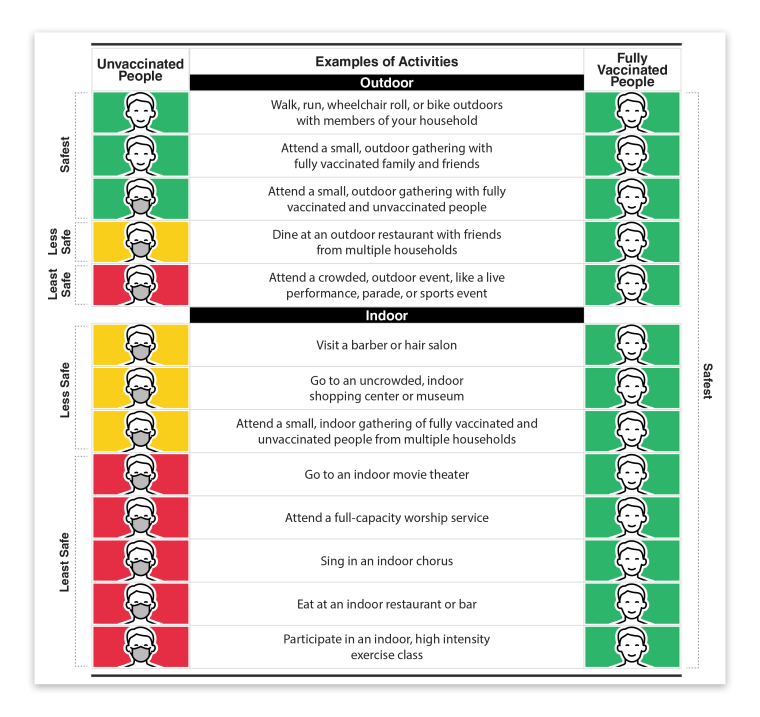The Centers for Disease Control and Prevention announced Thursday that people who are fully vaccinated against Covid-19 no longer need to wear masks or physically distance — whether indoors or outdoors in most circumstances.
"We have all longed for this moment when we can get back to some sense of normalcy," the CDC's director, Dr. Rochelle Walensky, said during a media briefing Thursday afternoon.
Full coverage of the coronavirus outbreak
"Based on the continuing downward trajectory of cases, the scientific data on the performance of our vaccines and our understanding of how the virus spreads," Walensky said, "that moment has come for those who are fully vaccinated."
President Joe Biden called the move a "great milestone" during remarks Thursday at the White House, adding that it was "made possible by the extraordinary success we've had in vaccinating so many Americans, so quickly."
More than 35 percent of the population has been fully vaccinated, according to the CDC.
Outside experts in infectious disease overwhelmingly hailed the move.
"Today marks a true turning point in the pandemic," said a former acting director of the CDC, Dr. Richard Besser, president of the Robert Wood Johnson Foundation. "If you're fully vaccinated, you are good to go. That's huge."
Michael Osterholm, director of the Center for Infectious Disease Research and Policy at the University of Minnesota, said: "It’s exactly what we ought to be doing right now. I think it follows the best science."
Dr. Amesh Adalja, an infectious disease physician with the Johns Hopkins Center for Health Security, said the move is "long overdue."
"Our goal was to tame this virus, to defang and to remove its ability to threaten hospitals," Adalja said. "I think we've accomplished that in the United States."
The recommendations come more than a year after the CDC first recommended that Americans should wear masks to protect against spreading or catching the coronavirus. At that time, the U.S. was logging more than 1,000 Covid-19 deaths a day.
Download the NBC News app for full coverage of the coronavirus outbreak
A person is considered fully vaccinated two weeks after the last dose of Covid-19 vaccine. That gives the immune system enough time to develop antibodies against the virus.
The new recommendation is proof, Walensky said, that the vaccines are working extraordinarily well. She cited several studies from the U.S. and Israel that demonstrated vaccines are more than 90 percent effective in preventing symptomatic Covid-19.
There are a few caveats, however. People who have compromised immune systems, for example, should talk to their doctors about continuing with mitigation measures. And even fully vaccinated people may still be asked to wear masks in certain places, such as in hospitals or other health care settings, as well as public transportation.
"Right now for travel, we're asking people to wear their masks," Walensky said. "We still have the requirement to wear masks when you travel on buses, trains and other forms of public transportation."

The guidance comes two days after Walensky and other federal health officials were grilled about mask guidance during a Senate hearing on Capitol Hill.
Sen. Bill Cassidy, R-La., said the American people had "lost patience" over the CDC's mixed messages on mask-wearing. In late April, the CDC said people who are fully vaccinated could forgo masks outdoors but not in crowded spaces.
"I think the CDC has received many contacts from the field, people in public health departments and academic centers, urging that they move" toward lifting mask recommendations, said Dr. William Schaffner, an infectious disease expert at Vanderbilt University Medical Center in Nashville, Tennessee.
"Vaccinated people need some sort of reward," Schaffner said.
Even though the vaccines work well, they are not perfect, and breakthrough infections can occur. Of the more than 117 million people in the U.S. who have been fully vaccinated, 9,245 later tested positive for Covid-19. Those illnesses have generally been mild.
Meanwhile, even those who have been vaccinated should still feel comfortable wearing masks if they choose, experts said. It is clear that masking and physical distancing this winter worked to stop the spread of respiratory diseases, such as the flu.
"We have all been getting such comfort out of wearing our masks and keeping apart," Besser said. "And now to say, OK, it's safe to come out? It's going to take a little while for people to internalize that."
Dr. Peter Hotez, dean of the National School of Tropical Medicine at Baylor College of Medicine in Houston, warned against relaxing mitigation measures too much, especially in states with lower vaccination rates.
"Transmission is still high in certain parts of the country, and this needs to be monitored," Hotez said. "If transmission starts going up again, we may have to be prepared to modify this."
For now, the CDC guidance applies only to those who have been fully vaccinated. Soon, that group will include children ages 12 and older, now that the CDC and the Food and Drug Administration have both signed off on Covid-19 vaccines for that age group.
The CDC is expected to update its guidance on children in school and summer camps soon.
For those who remain unvaccinated or who have only had a single dose of either the Moderna or Pfizer vaccines, Walensky advised continuing to wear masks.
Follow NBC HEALTH on Twitter & Facebook.



